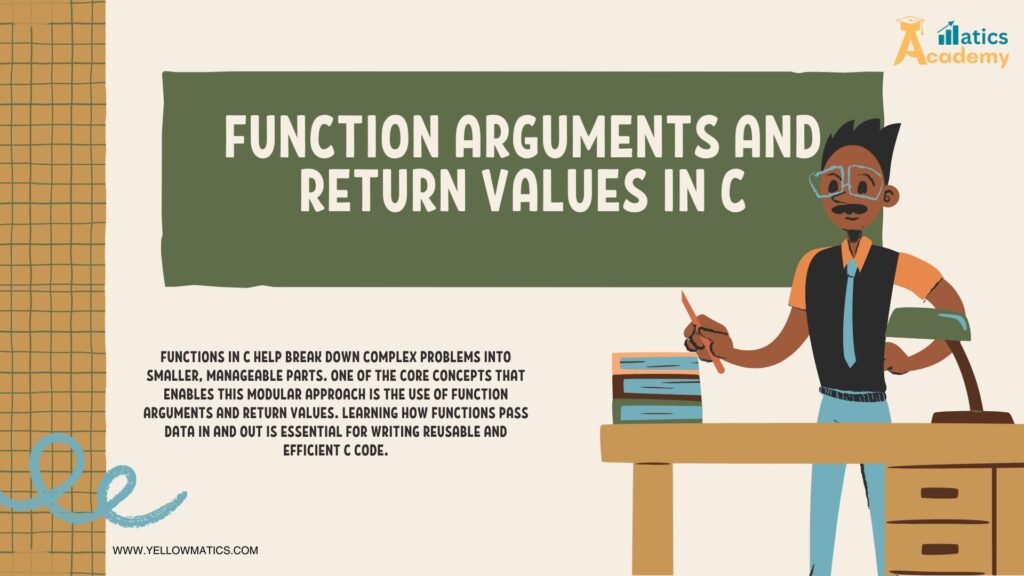Functions in C help break down complex problems into smaller, manageable parts. One of the core concepts that enables this modular approach is the use of function arguments and return values. Learning how functions pass data in and out is essential for writing reusable and efficient C code.

What Are Function Arguments in C?
Function arguments refer to the values you provide to a function at the time of its call. They allow the programmer to send data into the function for processing.
Syntax of Function with Arguments:
void greet(char name[]) {
printf("Hello, %s!", name);
}Calling the Function:
greet("Alice");
In this example, "Alice" is the argument passed to the function greet.
Types of Function Arguments C primarily supports two types of argument-passing mechanisms:
1. Call by Value
- The function receives a copy of the actual value passed by the caller
- Changes made inside the function do not affect the original variable.
Example:
void square(int x) {
x = x * x;
}2. Call by Reference (Simulated using Pointers)
- The program passes the variable’s address to the function using pointers.
- Changes made inside the function reflect in the original variable.
Example:
void update(int *x) {
*x = *x + 10;
}What Are Return Values in C?
A return value is the result that a function gives back to the calling function after execution. The function returns a value, and the program can reuse or store this result for further operations.
Syntax of Return Statement:
int sum(int a, int b) {
return a + b;
}
Using the Return Value:
int result = sum(5, 3); // result is 8
You can return any valid C data type: int, float, char, or even pointers and structures.
When to Use Arguments and Return Values
| Use Case | Argument Needed | Return Value Needed |
|---|---|---|
| Input required, no output | ✅ Yes | ❌ No |
| No input, result needed | ❌ No | ✅ Yes |
| Input required, result needed | ✅ Yes | ✅ Yes |
| Neither input nor result needed | ❌ No | ❌ No |
Best Practices
- Use meaningful parameter names to improve code readability.
- Prefer call by reference when you want to modify the original data.
- Always return a value from non-
voidfunctions to avoid undefined behavior. - Validate arguments before processing inside the function to avoid errors.
Conclusion
Understanding function arguments and return values in C is essential for writing modular, readable, and efficient programs. Whether you pass simple variables or complex data structures, mastering these concepts will elevate your programming skills and help you write cleaner code.
Keep practicing with different types of arguments and return values to gain confidence!
Interview Questions
1.What is the difference between call by value and call by reference in C? (HCL)
In call by value, the function receives a copy of the argument, so changes inside the function do not affect the original variable. In call by reference, the function receives the memory address of the argument using pointers, allowing changes to reflect in the original variable.
2.Can a function return multiple values in C? If not, how can it be achieved? (Infosys)
C functions cannot return multiple values directly. However, you can achieve this using pointers or structures. By passing pointer arguments, the function can modify multiple variables.
3.What happens if a function does not have a return statement? (IBM)
If a function has a return type other than void and lacks a return statement, it may lead to undefined behavior or garbage return values. Functions with void return type can omit the return statement.
4.Why should we use return values in functions? (Google)
Return values allow a function to send data back to the caller, making it reusable and modular. This helps maintain clean and manageable code with clear outputs.
5.How does argument passing enhance reusability in C programming? (Meta)
By passing arguments to functions, you can generalize logic and apply it to different inputs. This prevents code repetition and enhances the function’s reusability across various scenarios.
Now Paly Time :
